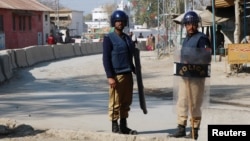Pakistanis who make false accusations of blasphemy should receive the same punishment as those convicted of the offense, a special committee on human rights in Pakistan's Senate recommended Tuesday.
"This recommendation does not intend to tamper with the existing blasphemy law of the country. It suggests that the law should not be misused," Nasreen Jalil, head of the special committee, told VOA.
Blasphemy is considered an enormously sensitive charge in Pakistan. Under Pakistani law, insulting the Prophet Muhammad carries the death penalty, and there have always been concerns about its misuse.
One of the country's top courts recently ordered Pakistan's parliament to enact legislation against those who misuse the country's blasphemy law.
Criticizing, or even talking about, Pakistan's blasphemy law has inherent dangers as well. In 2011, Salman Taseer, the governor of Pakistan's Punjab province, was killed by his own bodyguard after Taseer demanded reforms in the blasphemy law. The bodyguard was later hanged, but he was considered a hero by many in the country.
Jalil added that in 2001, Pakistan's Islamic Ideology Council suggested equal punishment for false accusers and also suggested that accusers take an oath in the presence of a government official and present two witnesses who could support the claim.
"And that's why we have presented both of these recommendations again in the Senate," Jalil said.
Senator objects
However, a member of the same committee opposed the recommendations, calling them an "attempt to sabotage the [current] blasphemy law in Pakistan."
"Is this the only law which is being misused in the country? Are there no other laws that need attention?" asked Senator Mufti Abdul Sattar.
According to Jalil, with the exception of Sattar, all other committee members understand that the only purpose of the recommendations is to ensure the blasphemy law is not misused.
Under the existing laws, a person making a false accusation can face only proceedings under Section 182 of the Pakistan Penal Code, which carries a maximum punishment of six months in jail, or a fine of 1,000 rupees (less than $10).
While the state has never executed anyone under the blasphemy law, mere allegations have prompted mob violence and lynchings.
Since 1990, there have been at least 67 killings over unproven allegations of blasphemy, Reuters reported this year.




